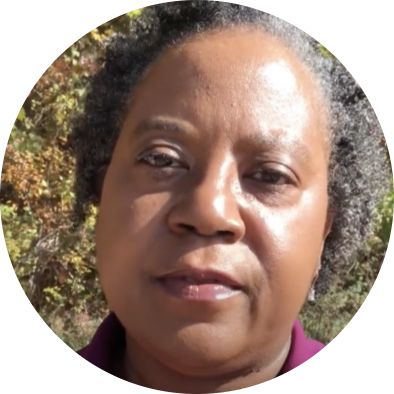Learning from those most impacted by Long COVID

RECOVER Representatives play an important role within the RECOVER Initiative. They help ensure RECOVER studies are informed by and reflect the lived experiences of people affected by Long COVID.
Representatives Bring Diverse Perspectives to RECOVER
Representatives include people who:
- where COVID, Long COVID, or both have affected large numbers of people
- where people have lower incomes
- where people are medically underserved
- where people of color are burdened by COVID, Long COVID, or both
“I’ve seen the immediate impact that my voice, opinions, and experience have had…this is probably one of the rare times I’ve seen regular people’s thoughts, opinions, and experiences be applied and used for the good of their community and so quickly.”
Teresa, Georgia
RECOVER Representative
What Do RECOVER Representatives Do?
Representatives work to ensure RECOVER meets the needs of people affected by Long COVID by contributing in important ways to RECOVER studies. These contributions may include:
- Joining meetings with RECOVER researchers to ensure patient and family needs are considered
- Giving feedback on study designs to improve RECOVER studies
- Reviewing study materials to make sure they represent patient voices and are easy to understand
- Helping to share RECOVER research findings with their networks
- Sharing their knowledge and personal experiences with COVID and Long COVID
Representatives’ participation is renewed annually, and they receive compensation for their time.

How Can I Become a RECOVER Representative?
You can become a RECOVER Representative in 1 of 2 ways:
- By being nominated by someone else
- By submitting your own application
Whether you are nominated or apply, you will need to complete a brief survey online or over the phone. The survey includes questions about:
- Your background, including your age, gender identity, race/ethnicity, and where you live
- Your experience with COVID and Long COVID
- Your experience with medical or social research
- Your experience (personal or professional) with community-engaged work
- Your reasons for wanting to become a Representative
- Your availability to attend meetings
A team from RECOVER reviews all survey responses and selects people to serve as Representatives.
If you want to learn more about becoming a RECOVER Representative, please contact the RECOVER Administrative Coordinating Center, which coordinates RECOVER Representatives, at RECOVER_REPS@rti.org.

RECOVER Representatives’ Contributions & Engagement Milestones
Since 2021, RECOVER Representatives have participated in multiple efforts to ensure RECOVER is one of the most patient-centered and inclusive research initiatives of its kind. They have:
Helped make it possible for more people to participate in RECOVER research
Gathered important feedback from people taking part or interested in taking part in RECOVER studies
Shared information about the progress RECOVER is making within their communities
Expand the sections below to learn more about these activities.
-
Representatives Start Working on RECOVER Research Papers
Representatives partner with RECOVER researchers to share study findings reflective of their communities. -
Extend Enrollment Period for Diverse Populations
Representatives from Hispanic and rural communities help RECOVER researchers recruit more study participants from their communities. -
Legal Next of Kin Surveys
Representatives provide caregiver and disability perspectives to improve the form for the families of people enrolled in RECOVER autopsy studies. -
Plain Language Summaries
RECOVER’s National Community Engagement Group (NCEG) Communications Subcommittee reviews RECOVER plain language research summaries and other dissemination materials. -
Authorship Trainings
The NCEG Publications Subcommittee develops authorship training for Representatives and researchers.
-
Creation of NCEG Subcommittees
Representatives join NCEG Publications, Representative Engagement, and Communications Subcommittees. -
RECOVER Research Review (R3) Seminars
Multiple Representatives speak as panelists at R3 seminars. -
Representatives Advocate for Additional Seats
NCEG Co-Chairs successfully petition for additional Representative seats on the Cores Operations Group (COG) and Steering Committee. -
Creation of Representative Newsletter
The NCEG Representative Engagement Subcommittee collaborates with RECOVER Leadership to make communications with Representatives more transparent. -
NCEG Co-Chairs Meet with NIH Leadership
Co-Chairs work with NIH to guide community engagement restructuring.
-
Inclusion Criteria Extension
Representatives support changing inclusion criteria to extend the period from a prior positive COVID test to 36 months. -
Create Community-Specific Study Materials
Representatives join focus groups to create recruitment materials tailored to American Indian/Alaskan Native, Black, and Hispanic communities. -
Participant Feedback Questionnaire
Representatives help create a questionnaire to collect feedback from participants about their experiences with the RECOVER studies. -
Representative Journey Video
Representatives help create a video showing how they impact RECOVER. -
Integrative Physiology Task Force
Representatives provide input on tests to measure how Long COVID affects a range of body functions. -
Modifications to Adult Comorbidities Case Report Form
The COG approves these recommendations. -
Clinical Trials Research Opportunity Announcements (ROAs)
Representatives review and provide feedback on how RECOVER engages researchers interested in studying potential treatments for Long COVID. Representatives also join the protocol working groups and provide input on the design of RECOVER clinical trials. -
Representatives Provide Feedback on Adult Study
The Steering Committee and Participant Experience Representatives provide feedback on the adult protocol symptom questionnaire and Manual of Operations and Procedures (MOP).
-
Representatives Join Steering and Executive Committees
Representatives gain seats on the Steering and Executive committees. -
Hold First NCEG Meeting
More than 15 Representatives attend. -
Create Learning Hubs
Create Learning Hub forums to meet Representatives’ needs and engage with study sites. -
Draft Representative Authorship Guidelines
Co-develop process for Representatives working on RECOVER manuscripts. -
Update Representative Payment Process
Representatives vote on different payment options and choose how often to be paid. -
U.S. Department of Health and Human Services (HHS) invites RECOVER to Present on Representative Engagement
The Community Engagement team presents strategies and accomplishments to HHS. -
Representatives Evaluate Community Engagement Structure
Representatives revise roles, responsibilities, and engagement trainings. -
White House Long COVID Council
Council presents at NCEG meeting at Representatives’ request.
-
Help Create Study Plans
Representatives attend meetings to help create study plans. -
Draft Symptom Survey
Representatives complete first draft of participant symptom survey taken from Body Politic (patient group) survey. -
Set Rule That Positive COVID Tests are Not Needed for Infected Participants
Participants who had COVID no longer need to present a positive COVID test result to join observational cohort studies. -
Revise SOP (Standard Operating Plan) & CRF (Case Report Form)
Representatives change SOP to return clinical results to participants. Representatives change CRF to give people with myalgic encephalomyelitis/chronic fatigue syndrome (ME/CFS) accommodations to complete it. -
Give Feedback on Recruitment Materials
Representatives review and give input on materials to recruit study participants. -
Include Participants who Had COVID at Any Time in the Past
Representatives update inclusion criteria so people who had COVID at the start of the pandemic (including > 12 months ago) can join studies. -
Reorganize Symptom Survey
Representatives reorganize the symptom survey to ask about Long COVID physical symptoms first, then mental health symptoms. -
Add More Questions to Participant Survey
Representatives add the question “Do you think you have Long COVID?” and questions specific to ME/CFS.
-
Finalize Committee Assignments
Representatives receive their preferred committee assignments.
“I’ve used my role within the patient experience to enlighten the doctors on some of the things I experienced at my particular site. Those experiences were then shaped into directives that were then distributed to several of the sites and were immediately implemented.”
Belinda, Maryland
RECOVER Representative
RECOVER Representative Involvement
RECOVER Representatives are involved across the RECOVER Initiative. They serve on governance and scientific committees, contribute to protocol working groups and writing groups, and are members of the National Community Engagement Group (NCEG). The NCEG includes multiple sub-committees, and its members sit on the Observational Consortium and Clinical Trials Steering Committees.
View NCEG Members and Other RECOVER Leadership


RECOVER’s National Community Engagement Group
The National Community Engagement Group (NCEG) provides leadership for RECOVER’s more than 70 Representatives. The NCEG promotes meaningful discussion, genuine partnership, and shared decision-making by:
- Providing input on RECOVER research, communication activities, and more
- Placing equity at the center of RECOVER
- Including the experiences and perspectives of patients, caregivers, and community members
Over half of the NCEG’s members identify as patients with Long COVID. Of the NCEG’s 6 Co-Chairs, 2 sit on the Observational Consortium Steering Committee. One of the NCEG Co-Chairs also sits on the Clinical Trials Steering Committee. Each Steering Committee provides scientific leadership and oversees RECOVER operations and programs for their program areas. Two NCEG Co-Chairs sit on the RECOVER Executive Committee, which directs the overall strategy of RECOVER. NCEG Co-Chairs may serve up to 2 one-year terms.
Learn about NCEG selection and more on our FAQ page.